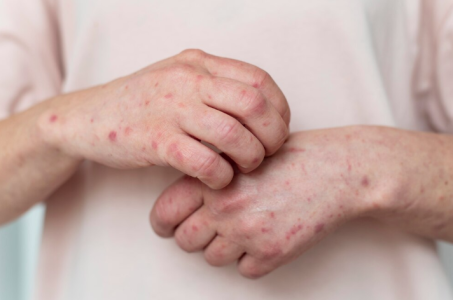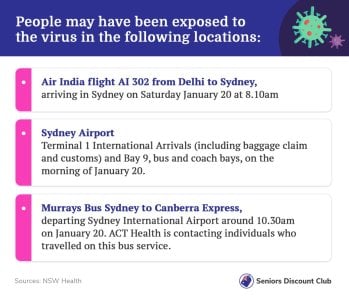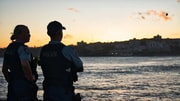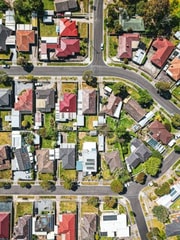'Highly contagious' passenger at an Aussie airport prompts urgent health warning
By
VanessaC
- Replies 15
In a world where international travel is commonplace, the risk of infectious diseases spreading across borders is a reality many must face.
Recently, NSW Health issued an urgent alert after a passenger infected with measles, a highly contagious airborne virus, travelled through Sydney International Airport and landed in the ACT.
The adult passenger, returning from Asia, was found to be infectious during their travel.
Asia, like Europe, has been grappling with ongoing measles outbreaks, making this a matter of concern for Australian health authorities.
Dr Christine Selvey, Director of Communicable Diseases Branch for NSW Health, has urged the public to be vigilant for signs and symptoms of measles, especially if they were on the same flight or visited the same locations as the infected individual.
Measles is a vaccine-preventable viral disease that spreads through the air when an infected person coughs or sneezes.
It is highly contagious and can lead to serious complications, particularly in children under five.
Despite being preventable, measles remains a common cause of death in some parts of the world, highlighting the importance of vaccination.
'Symptoms of measles include fever, runny nose, sore eyes and a cough, usually followed three or four days later by a red, blotchy rash that spreads from the head to the rest of the body,' Dr Selvey explained.
'Symptoms may appear between [seven] and 18 days after an exposure, so it's important for people to stay vigilant if they've been exposed, and if they develop symptoms, please call ahead to their GP or emergency department to ensure they do not spend time in the waiting room with other patients.'
'This should be a reminder for everyone to check that they are protected against measles, which is very infectious.'
One reliable and effective defence against measles is the measles-mumps-rubella (MMR) vaccine.
For children between the ages of 12 and 18 months, the vaccine is covered by the National Immunization Program (NIP).
In addition, anyone in NSW born during or after 1966 who hasn't received two doses of the vaccination is eligible for free.
When travelling to areas that are deemed high risk for measles, children between the ages of six and twelve months can receive their first dose of the MMR vaccine earlier, provided they first check in with their GP.
Those who are unsure of whether they have had two doses 'should get a vaccine as additional doses are safe'.
Below are the locations where people may have been exposed to the virus:

If you or a loved one is experiencing measles symptoms or have questions about measles, please call your GP or Healthdirect at 1800 022 222.
Have you, or anyone you know, been diagnosed with measles before? Share your stories with us in the comments below.
Recently, NSW Health issued an urgent alert after a passenger infected with measles, a highly contagious airborne virus, travelled through Sydney International Airport and landed in the ACT.
The adult passenger, returning from Asia, was found to be infectious during their travel.
Asia, like Europe, has been grappling with ongoing measles outbreaks, making this a matter of concern for Australian health authorities.
Dr Christine Selvey, Director of Communicable Diseases Branch for NSW Health, has urged the public to be vigilant for signs and symptoms of measles, especially if they were on the same flight or visited the same locations as the infected individual.
Measles is a vaccine-preventable viral disease that spreads through the air when an infected person coughs or sneezes.
It is highly contagious and can lead to serious complications, particularly in children under five.
Despite being preventable, measles remains a common cause of death in some parts of the world, highlighting the importance of vaccination.
'Symptoms of measles include fever, runny nose, sore eyes and a cough, usually followed three or four days later by a red, blotchy rash that spreads from the head to the rest of the body,' Dr Selvey explained.
'Symptoms may appear between [seven] and 18 days after an exposure, so it's important for people to stay vigilant if they've been exposed, and if they develop symptoms, please call ahead to their GP or emergency department to ensure they do not spend time in the waiting room with other patients.'
'This should be a reminder for everyone to check that they are protected against measles, which is very infectious.'
One reliable and effective defence against measles is the measles-mumps-rubella (MMR) vaccine.
For children between the ages of 12 and 18 months, the vaccine is covered by the National Immunization Program (NIP).
In addition, anyone in NSW born during or after 1966 who hasn't received two doses of the vaccination is eligible for free.
When travelling to areas that are deemed high risk for measles, children between the ages of six and twelve months can receive their first dose of the MMR vaccine earlier, provided they first check in with their GP.
Those who are unsure of whether they have had two doses 'should get a vaccine as additional doses are safe'.
Below are the locations where people may have been exposed to the virus:
Key Takeaways
- NSW Health has issued an alert advising the public to look out for measles symptoms after an infectious passenger travelled through Sydney International Airport.
- The infectious individual was returning from Asia and was in specific locations where others may have been exposed.
- Dr Christine Selvey from NSW Health emphasised the importance of vaccination, particularly before overseas travel due to ongoing measles outbreaks worldwide.
- NSW Health advises that the measles-mumps-rubella (MMR) vaccine is safe and effective and is free for certain individuals, with the recommendation to ensure two doses have been received.
Have you, or anyone you know, been diagnosed with measles before? Share your stories with us in the comments below.
Last edited:









